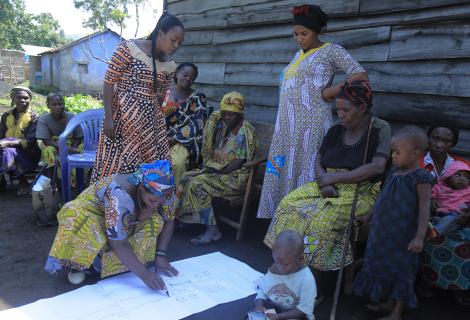
The Country Strategy Paper (2021-2025) is intended to guide the transformation of ActionAid Democratic Republic of Congo (AA DRC) to become more relevant, impactful and sustainable to achieve its mission. It provide strategic direction to a more focused mandate and niche to respond to the strategic and immediate needs of communities by effectively consolidating its programme, advocacy and policy response and contribute to the wider humanitarian response and discourse. This is the second Country Strategy Paper of the Country Programme (CP).
Over the last three years, AA DRC reinvigorated and repositioned itself as a key humanitarian actor after difficult institutional and technical challenges strong enough to truncate the existence of the CP in the previous strategy. There is substantial assurance and potentials for the CP to become one of the centres for relevant, impactful and sustainable humanitarian programming, policy and advocacy in ActionAid.
AA DRC will prioritizes safety and dignity for crisis-affected populations as a fundamental responsibility beyond humanitarian assistance in the implementation of this strategy. The approach in this CSP will therefore be guided by the globally accepted humanitarian principles of humanity, neutrality, impartiality, and independence and the four key components of the ActionAid Humanitarian Signature: 1) shifting the power, 2) women’s leadership 3) accountability to affected communities, underpinned by 4) resilience and sustainability. To achieve its mandate, AA DRC will prioritise working directly with host families and communities, disadvantaged indigenous people (pigmies), unaccompanied and separated children, adolescent girls, persons with disabilities affected by crisis, rural women smallholder farmers, young people, internally displaced persons, refugees and returnees.
AA DRC beliefs that gender equality and poverty eradication can be secured through effective community and women led protection and accountability mechanisms supported by sustainable and resilient livelihoods. This is achieved through purposeful individual and collective action of people affected by crisis to shift and challenge unequal and unjust power from the household level to local, national and international levels. This will ensure a system change that will transform national and international humanitarian programming and responses to build the resilience of people affected by crisis. ActionAid DRC’s programme framework in the CSP period will therefore focus on humanitarian work to achieve gender equality and poverty eradication by strengthening the resilience of persons of concern, communities and groups of persons of concern to respond to shocks and stress. The framework will form the basis of framing and defining interventions to focus on economic, climate and gender related drivers of vulnerability.
In its programme Priorities, AA DRC will consistently highlight how the climate crisis and economic crisis (re)create vulnerability, exacerbating the impact of humanitarian crises and becoming significant barriers in supporting communities to bounce back better.